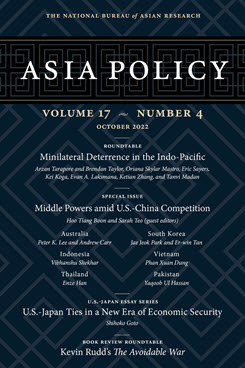Essay in Asia Policy 17.4
Caught in the Middle? Middle Powers amid U.S.-China Competition
This essay provides an overview of this special issue, which seeks to better understand middle-power thinking and strategies in coping with the escalating competition between the U.S. and China.
EXECUTIVE SUMMARY
MAIN ARGUMENT
Competition is now the primary format of U.S.-China relations, spanning key dimensions of international politics. The pressures radiating from this structural shift have led Indo-Pacific states to calibrate their policies to this new geostrategic circumstance. This special issue focuses on the responses of a category of regional states understood as middle powers. How have regional middle powers adapted to the intensifying U.S.-China rivalry? What are the considerations and drivers that inform their coping strategies? To address these salient, policy-relevant questions, this special issue spotlights six Indo-Pacific middle powers—namely, Australia, South Korea, Indonesia, Vietnam, Thailand, and Pakistan—and unpacks their logic and ways of navigating the complexities of the Sino-U.S. rivalry. The insights derived in this issue contribute to broader policy thinking on the evolving choices of middle powers and are instructive for the strategic policies of other regional states in an era of great-power competition.
POLICY IMPLICATIONS
- Amid the growing U.S.-China contest, regional middle powers perceive a narrowing strategic space for maneuverability.
- This reduced strategic space does not equate to decreasing strategic autonomy, however. Regional middle powers retain considerable agency to mold their own paths and that of the broader strategic environment, including developing options to mitigate any fallout from the Sino-U.S. rivalry.
- A considerable degree of this middle-power agency is animated by elite calculations of the respective domestic interests at stake.
- Strategic ambiguity toward China and the U.S. remains the dominant policy preference of most middle powers probed in this issue.
Hoo Tiang Boon is Associate Professor and Coordinator of the China Programme in the Institute of Defence and Strategic Studies at the S. Rajaratnam School of International Studies (RSIS) at Nanyang Technological University (Singapore).
Sarah Teo is Assistant Professor and Coordinator of the Regional Security Architecture Programme in the Institute of Defence and Strategic Studies at RSIS at Nanyang Technological University (Singapore).
About Asia Policy
Asia Policy is a peer-reviewed scholarly journal presenting policy-relevant academic research on the Asia-Pacific that draws clear and concise conclusions useful to today’s policymakers. Asia Policy is published quarterly in January, April, July, and October and accepts submissions on a rolling basis. Learn more


